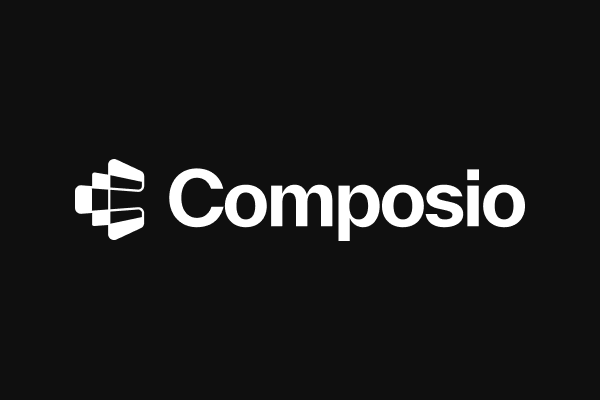
Composio Tools Integration
🤖 Composio Sample Agent
This agent demonstrates how to connect to over 300 different apps using Composio. Composio is a service that provides a simple method for connecting to a multitude of different apps, such as CRMs, ERP, financial tools, worksuite products and more.
To get started, sign up at Composio.dev.
Composio Configuration
There are two steps to enabling an integration with Composio.
The first is adding the integration to the app, such as Salesforce or Google. You can do this via the "Apps" explorer in Composio.
Next you'll have to create a connection by authenticating with the selected app. These connections are specific to users; you may only need to create a single connection if this tool is only used with a single instance, e.g. your own Salesforce account. You can create multiple connections if, for example, you plan on having multiple users connect to their instances of the 3rd-party app. When creating the connection, the User ID can be whatever you use to track users, or simply default if you're the only one connecting, but you'll need to pass this ID to Composio from your agent code (in this sample repo, we chose user_12345).
Now you should have (a) an integration such as Salesforce and (b) a user-specific connection to that integration. Add your COMPOSIO_API_KEY as a secret and you're ready to go.
📋 Prerequisites
Before you begin, ensure you have the following installed:
- Bun: Version 1.2.4 or higher
🚀 Getting Started
Authentication
Before using Agentuity, you need to authenticate:
This command will open a browser window where you can log in to your Agentuity account.
Creating a New Agent
To create a new agent in your project:
Follow the interactive prompts to configure your agent.
Development Mode
Run your project in development mode with:
This will start your project and open a new browser window connecting your agent to the Agentuity Console in DevMode, allowing you to test and debug your agent in real-time.
🌐 Deployment
When you're ready to deploy your agent to the Agentuity Cloud:
This command will bundle your agent and deploy it to the cloud, making it accessible via the Agentuity platform.
📚 Project Structure
├── agents/ # Agent definitions and implementations
├── node_modules/ # Dependencies
├── package.json # Project dependencies and scripts
└── agentuity.yaml # Agentuity project configuration
🔧 Configuration
Your project configuration is stored in agentuity.yaml. This file defines your agents, development settings, and deployment configuration.
🛠️ Advanced Usage
Environment Variables
You can set environment variables for your project:
Secrets Management
For sensitive information, use secrets:
📖 Documentation
For comprehensive documentation on the Agentuity JavaScript SDK, visit: https://agentuity.dev/SDKs/javascript
🆘 Troubleshooting
If you encounter any issues:
- Check the documentation
- Join our Discord community for support
- Contact the Agentuity support team
📝 License
This project is licensed under the terms specified in the LICENSE file.